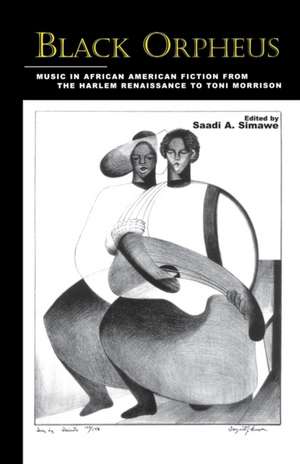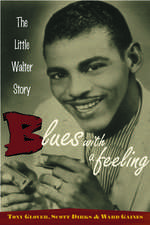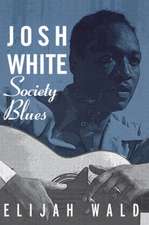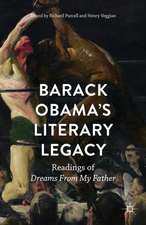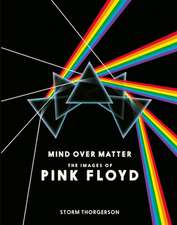Black Orpheus: Music in African American Fiction from the Harlem Renaissance to Toni Morrison: Border Crossings
Autor Saadi A. Simaween Limba Engleză Paperback – 23 apr 2015
The nine original essays in Black Orpheus examines the Orphic theme in the fiction of such African American writers as Jean Toomer, Langston Hughes, Claude McKay, James Baldwin, Nathaniel Mackey, Sherley Anne Williams, Ann Petry, Ntozake Shange, Alice Walker, Gayl Jones, and Toni Morrison. The authors discussed in this volume depict music as a mystical, shamanistic, and spiritual power that can miraculously transform the realities of the soul and of the world. Here, the musician uses his or her music as a weapon to shield and protect his or her spirituality. Written by scholars of English, music, women’s studies, American studies, cultural theory, and black and Africana studies, the essays in this interdisciplinary collection ultimately explore the thematic, linguistic structural presence of music in twentieth-century African American fiction.
| Toate formatele și edițiile | Preț | Express |
|---|---|---|
| Paperback (1) | 486.42 lei 43-57 zile | |
| Taylor & Francis – 23 apr 2015 | 486.42 lei 43-57 zile | |
| Hardback (1) | 1009.55 lei 43-57 zile | |
| Taylor & Francis – 12 mai 2000 | 1009.55 lei 43-57 zile |
Preț: 486.42 lei
Nou
Puncte Express: 730
Preț estimativ în valută:
93.07€ • 97.44$ • 77.01£
93.07€ • 97.44$ • 77.01£
Carte tipărită la comandă
Livrare economică 07-21 aprilie
Preluare comenzi: 021 569.72.76
Specificații
ISBN-13: 9781138001770
ISBN-10: 1138001775
Pagini: 294
Dimensiuni: 138 x 216 x 15 mm
Greutate: 0.39 kg
Ediția:1
Editura: Taylor & Francis
Colecția Routledge
Seria Border Crossings
Locul publicării:Oxford, United Kingdom
ISBN-10: 1138001775
Pagini: 294
Dimensiuni: 138 x 216 x 15 mm
Greutate: 0.39 kg
Ediția:1
Editura: Taylor & Francis
Colecția Routledge
Seria Border Crossings
Locul publicării:Oxford, United Kingdom
Notă biografică
Saadi Simawe is Assistant Professor of English and Africana Studies at Grinnell College, Iowa.
Cuprins
What's in a Sound? The Orphic Theme of Music in African American Fiction, Saadi A. Simawe; Singing the Unsayable: Theorizing Music in Dessa Rose, Jacquelyn A. Fox-Good; Claude McKay: Music, Sexuality, and Literary Cosmopolitanism, Tom Lutz; It Don't Mean an Thing If It Ain't Got That Swing: Jazz's Many Uses for Toni Morrison, Alan Rice; That Old Black Magic?: Gender and Music in Ann Petry's Fiction, Johanna X., K. Garvey; Shange and Her Three Sisters; Sing a Liberation Song: Variations on the Orphic Theme, Maria V. Johnson; Black and Blue: The Female Body of Blues Writing in Toomer, Morrison, and Jones, Kathy Boutry; Nathaniel Mackey's Unit Structures, Joseph Allen; Black Moves, White Ways, Every Body's Blues: Orphic Power in Langston Hughes's The Ways of White Folks, Jane Olmstead; Siren Songs, Jungle Music, and the Black Vernacular in Works by Baldwin, Ntozake Shange, and Ishmael Reed, Chezia Thompson Cager; Music and Memory in Toni Morrison's Novels, Veeno Deo; Shamans of Song: Music and the Politics of Culture in Alice Walker's Early Fiction, Saadi A. Simawe
Descriere
The legendary Greek figure Orpheus was said to have possessed magical powers capable of moving all living and inanimate things through the sound of his lyre and voice. Over time, the Orphic theme has come to indicate the power of music to unsettle, subvert, and ultimately bring down oppressive realities in order to liberate the soul and expand human life without limits. The liberating effect of music has been a particularly important theme in twentieth-century African American literature.
The nine original essays in Black Orpheus examines the Orphic theme in the fiction of such African American writers as Jean Toomer, Langston Hughes, Claude McKay, James Baldwin, Nathaniel Mackey, Sherley Anne Williams, Ann Petry, Ntozake Shange, Alice Walker, Gayl Jones, and Toni Morrison. The authors discussed in this volume depict music as a mystical, shamanistic, and spiritual power that can miraculously transform the realities of the soul and of the world. Here, the musician uses his or her music as a weapon to shield and protect his or her spirituality. Written by scholars of English, music, women’s studies, American studies, cultural theory, and black and Africana studies, the essays in this interdisciplinary collection ultimately explore the thematic, linguistic structural presence of music in twentieth-century African American fiction.
The nine original essays in Black Orpheus examines the Orphic theme in the fiction of such African American writers as Jean Toomer, Langston Hughes, Claude McKay, James Baldwin, Nathaniel Mackey, Sherley Anne Williams, Ann Petry, Ntozake Shange, Alice Walker, Gayl Jones, and Toni Morrison. The authors discussed in this volume depict music as a mystical, shamanistic, and spiritual power that can miraculously transform the realities of the soul and of the world. Here, the musician uses his or her music as a weapon to shield and protect his or her spirituality. Written by scholars of English, music, women’s studies, American studies, cultural theory, and black and Africana studies, the essays in this interdisciplinary collection ultimately explore the thematic, linguistic structural presence of music in twentieth-century African American fiction.
